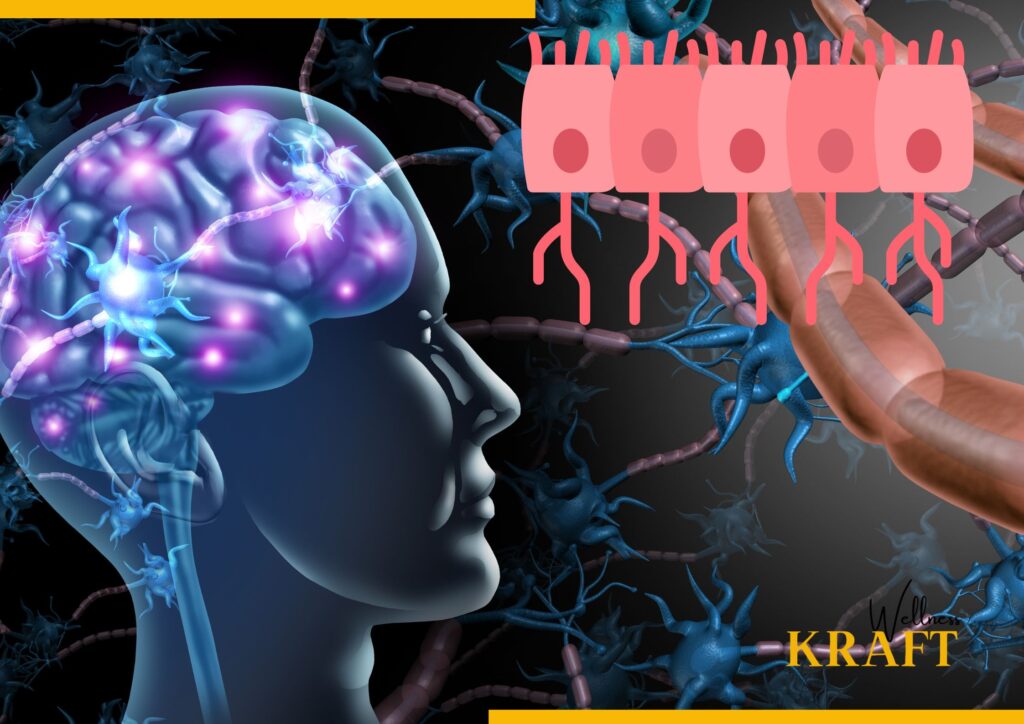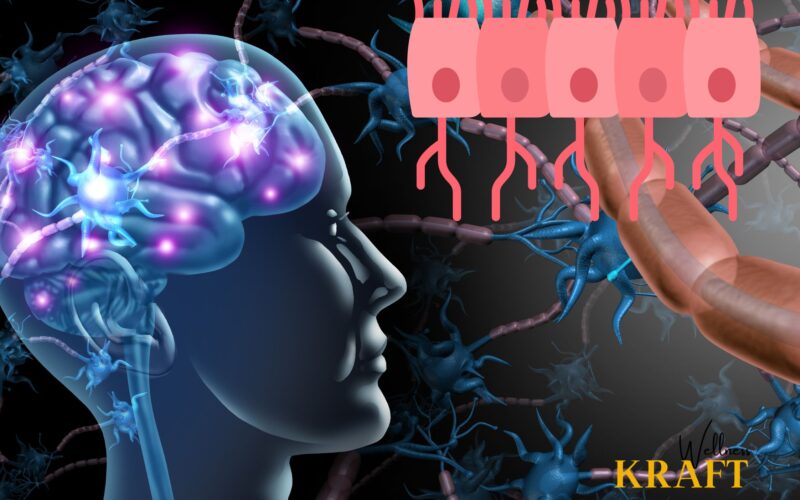Table of Contents
Introduction
The blood-brain barrier (BBB) is a significant barrier that protects the brain from potentially hazardous substances while also controlling the movement of specific molecules and nutrients necessary for brain function. The specialized endothelial cells that line the brain’s blood vessels contribute to forming this semi-permeable barrier. These cells control the substances that enter and leave the brain.
Causes of Blood-Brain Barrier Dysfunction

Many things could put the BBB’s credibility at risk, including the following:
Infections: Certain infections can potentially damage the blood-brain barrier (BBB), making it easier for viruses to reach the brain.
Traumatic Brain Injury (TBI): A traumatic brain injury (TBI) is a type of injury that can affect the function of the blood-brain barrier.
Inflammation: Several conditions can cause inflammation, including multiple sclerosis and meningitis, which can compromise the blood-brain barrier.
Toxins: Exposure to environmental toxins or medicines can damage the integrity of the blood-brain barrier (BBB).
Age: The BBB can naturally become more porous as a result of the normal process of ageing.
Impact on Mental Health
Failure of the blood-brain barrier (BBB) can result in a variety of neurological illnesses and mental health problems, including the following:
Depression: There is a correlation between depression and inflammation, and increased permeability may be a contributing factor.
Alzheimer’s Disease: BBB disruption is linked to the development and progression of Alzheimer’s disease. Alzheimer’s disease is a neurodegenerative disease.
Schizophrenia: There is some evidence that suggests disruptions in the blood-brain barrier (BBB) may have a role in schizophrenia.
Anxiety Disorders: Dysfunctions in the blood-brain barrier (BBB) can affect the levels of neurotransmitters that are associated with anxiety disorders.
Precautions and Diagnosis of Blood-Brain Barrier (BBB) Dysfunction
The blood-brain barrier (BBB) protects the brain by controlling what substances can enter the central nervous system from the bloodstream. Brain infections, multiple sclerosis, and Alzheimer’s disease are among the neurological conditions that can arise from disruptions to the BBB. Preventing the progression of such conditions requires early recognition and proactive care.
Precautions to Protect the BBB
1. Maintain a Healthy Lifestyle:
- A balanced diet full of anti-inflammatory, omega-3, and antioxidants is crucial for the BBB’s health.
- Regular exercise enhances blood circulation and lowers inflammation to protect the integrity of the blood-brain barrier.
- Getting enough sleep promotes the brain’s natural BBB repair mechanisms and aids in the removal of toxins from the brain.
2. Manage Chronic Conditions:
- The BBB can become dysfunctional due to autoimmune diseases, diabetes, and hypertension (high blood pressure). Preserving the BBB is essential to managing these conditions with medicine and lifestyle modifications.
- It is possible to lower the risk of BBB damage by regularly checking blood pressure and blood sugar levels.
3. Avoid Harmful Substances:
- BBB deterioration might result from smoking and binge drinking. Avoiding these substances is one of the best strategies to stop BBB deterioration.
- Limiting exposure to environmental toxins, such as pollution and heavy metals, is also associated with a decreased risk of harm to the BBB.
4. Manage Stress:
- Persistent stress can make the BBB more permeable. Deep breathing exercises, yoga, and meditation are examples of stress-relieving practices that may support the structural integrity of the BBB.
Diagnosis of BBB Dysfunction
Diagnosing BBB dysfunction early is crucial for preventing the progression of neurological disorders. The following diagnostic methods are commonly used:
1. Magnetic Resonance Imaging (MRI):
- MRI is one of the best imaging modalities for identifying anomalies in the BBB. MRI can show brain structural problems, inflammation, and BBB leakage using sophisticated contrast chemicals.
- Functional magnetic resonance imaging (fMRI) maps brain activity and assesses how BBB dysfunction may affect various brain regions.
- A study published in 2023 in Frontiers in Neuroscience showed that advanced MRI techniques can be used to find the BBB permeability of people with multiple sclerosis. This shows that MRI can find early signs of BBB breakdown. (Nature)
2. Computed Tomography (CT) Scans:
- Even though they are less sensitive than MRIs, CT scans can still help identify tumours, brain enlargements, and other structural abnormalities that may affect the BBB.
- When BBB impairment is suspected in acute situations, such as the diagnosis of traumatic brain injuries, CT is frequently employed.
3. Cerebrospinal Fluid (CSF) Analysis:
- CSF analysis entails gathering and examining the fluid surrounding the brain and spinal cord. This may shed light on immunological responses, infections, or inflammation that could point to a breakdown of the BBB.
- Some antibodies or elevated protein levels in CSF may indicate BBB dysfunction, as shown in multiple sclerosis and other conditions.
4. Positron Emission Tomography (PET) Scans:
- PET imaging helps research BBB function in neurodegenerative illnesses like Alzheimer’s because it uses radioactive tracers to identify metabolic changes in the brain.
- PET imaging can give a thorough picture of how BBB dysfunction affects different parts of the brain.
Research Insights
The identification and comprehension of BBB dysfunction have made significant strides in recent research.
A 2023 article in Nature Reviews Drug Discovery looked at new ways to deliver drugs meant to cross the blood-brain barrier (BBB) safely. This showed how important it is to understand BBB permeability when making treatments for brain cancer and neurological disorders. (Nature)
Imaging, cerebrospinal fluid analysis, and other diagnostic techniques are essential for diagnosing blood-brain barrier dysfunction early in neurological conditions. Stress management, eating a balanced diet, and avoiding dangerous substances are all proactive precautions that can help protect the BBB. There is hope for better neurological health as long as research on novel approaches to assess and treat BBB-related illnesses continues.
For further reading, you can explore the research articles in (Nature)ps://(ScienceDaily)023-00180-z) and Frontiers in Neuroscience.
How to Strengthen the Blood-Brain Barrier (BBB)
The blood-brain barrier (BBB) is essential for shielding the brain from potentially hazardous substances and maintaining overall brain health. Maintaining mental health and preventing neurological problems are two benefits of strengthening the BBB. Here are a few ideas on how to help and possibly improve the BBB:
| Nutrient/Compound | Source | Benefits | How It Helps the BBB |
|---|---|---|---|
| Curcumin | Found in turmeric | Reduces oxidative stress and inflammation and supports endothelial cell function in the BBB. | Antioxidants help prevent age-related cognitive decline and reduce inflammation. |
| Omega-3 Fatty Acids | Fish oil (salmon, mackerel), flaxseed oil | Reduces inflammation and supports brain health. | Maintains BBB integrity and reduces the risk of neuroinflammation, especially in cases of deficiency. |
| Resveratrol | Grapes, red wine, berries | It supports the brain’s and endothelial cells’ structural integrity, which is crucial for BBB function. | Strengthens tight junctions between endothelial cells, reducing BBB permeability to harmful substances. |
| Vitamin D | Sunlight exposure, fatty fish, fortified dairy | A powerful antioxidant that supports the immune system. | It supports immune function and reduces inflammation. |
| Vitamin C | Citrus fruits, bell peppers, broccoli | Promotes relaxation without drowsiness and supports cognitive function. | Reduces oxidative stress in the brain, potentially protecting the BBB from free radical damage. |
| L-Theanine | Green tea | It is essential for maintaining BBB integrity and preventing disruptions linked to neurological diseases. | Reduces stress (a factor increasing BBB permeability), may protect against neurodegenerative diseases. |
| Magnesium | Nuts, seeds, leafy greens, supplements | The precursor to glutathione, a powerful antioxidant, reduces inflammation. | Regulates nerve function and reduces inflammation. |
| Quercetin | Apples, onions, green tea | It supports BBB cells and helps prevent disruptions that can lead to cognitive decline. | Strengthens BBB by reducing oxidative stress and preserving tight junctions between endothelial cells. |
| Zinc | Meat, shellfish, seeds | Antioxidant reduces inflammation and offers neuroprotective effects. | Supports immune function, which is essential for brain health. |
| N-Acetylcysteine (NAC) | Supplement form of cysteine amino acid | Precursor to glutathione, a powerful antioxidant, reduces inflammation. | Boosts glutathione levels, protecting BBB from oxidative stress and inflammation. |
Can BBB regenerate?
The blood-brain barrier (BBB) can regenerate to some extent, but the extent of the damage and the underlying reason will determine its ability to fully heal. To some extent, especially following minor injuries or disturbances, the endothelial cells that make up the blood-brain barrier (BBB) can repair and regenerate. The ability of the BBB to regenerate may be restricted in situations of severe or persistent damage, such as those resulting from neurodegenerative disorders, protracted inflammation, or traumatic brain traumas.
Factors that Influence BBB Regeneration:
- Damage: The body’s natural healing processes can frequently repair small inflammation or acute stress-induced alterations to the BBB. Severe or ongoing damage, on the other hand, may lead to persistent dysfunction.
- Age: While aging tends to reduce the BBB’s ability to repair itself, younger people often have a higher potential for regeneration.
- Basis Conditions: Conditions like multiple sclerosis, Alzheimer’s disease, or persistent inflammation that cause ongoing damage may impair the BBB’s capacity to regenerate.
Mechanisms of BBB Repair:
- Repair of Endothelial Cells: It is crucial for maintaining the blood-brain barrier’s selective permeability that the endothelial cells that line it can regenerate and repair tight connections.
- Neuroinflammation Management: It is essential for BBB repair to lower brain inflammation. Treatments that reduce inflammation can aid in repairing the integrity of the barrier.
Angiogenesis: The process of creating new blood vessels can aid in the BBB’s repair in damaged places. - Studies on BBB regeneration have revealed that specific proteins and growth factors, like vascular endothelial growth factor (VEGF), are involved in the BBB’s ability to repair damaged blood vessels. In order to restore BBB function, research is also looking into therapies that aim to strengthen the body’s natural repair mechanisms (ScienceDaily)(Nature)
Key Takeaways
- The BBB is vital for protecting the brain from harm.
- Dysfunction can contribute to various mental health disorders.
- Early diagnosis and treatment are critical for managing BBB-related conditions.
Frequently Asked Questions (FAQs)
1. What role does the BBB play in mental health?
The BBB regulates substances entering the brain, impacting neurotransmitter balance crucial for mental health.
2. Can stress affect the BBB?
Chronic stress may increase BBB permeability, potentially impacting mental health.
3. Are there natural ways to support BBB health?
Antioxidant-rich diets and regular exercise may help maintain BBB integrity.
4. How does aging affect the BBB?
Aging can compromise BBB function, making the brain more vulnerable to damage.
5. Can BBB dysfunction be reversed?
Depending on the cause, early intervention can help restore BBB function to some extent.
6. What diseases affect the BBB?
Conditions like multiple sclerosis, Alzheimer’s, and infections can disrupt BBB function.
7. Is there a genetic component to BBB dysfunction?
Some genetic factors can influence BBB integrity and susceptibility to disorders.
8. How do doctors test BBB function?
Imaging and cerebrospinal fluid analysis are common methods.
9. What lifestyle changes can protect the BBB?
Avoiding smoking, maintaining a healthy weight, and managing chronic conditions can help.
10. Can medications cross the BBB easily?
Some medications are designed to cross the BBB, while others require special formulations.
Concluding Thoughts
The blood-brain barrier is an essential brain defensive mechanism that, when impaired, has a significant negative influence on mental health. To preserve the health and wellbeing of the brain, one must be aware of its functions, the reasons behind malfunction, and practical management techniques.










